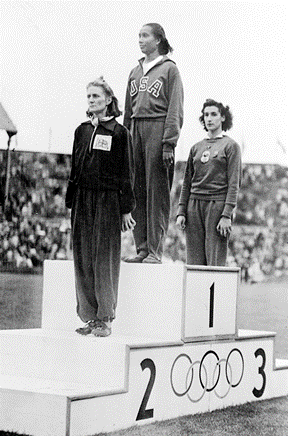Black women in sports

Alice Coachman on the medal stand after winning the high jump in the 1948 London Olympics. Coachman was the first black woman to win a gold medal in the Olympics.
March 12, 2021
Throughout history, women have shown black excellence in sports; however, most of them go unrecognized for their amazing accomplishments.
Black athletes were not given nearly enough honor or equality when it came to training.
The best gear, coaches, and facilities were closed off to People of Color for many years.
Alice Coachman was the first black woman to win a gold medal in the Olympics.
As both a female and a Person of Color Alice faced many prejudices.
In the 1930s, when Alice was growing up there wasn’t a lot of emphasis on female athletes.
She was denied the right to train with many clubs and teams because of her race.
The combination of these two prejudices should have hindered Alice Coachman’s ability to be one of the greatest of all time, but it didn’t.
Because the 1940 and 1944 Olympics were canceled due to World War II, Coachman had to delay her Olympic debut by eight years.
In the 1948 Olympics in London, Coachman participated in the high jump and set an Olympic-record at 5 feet, 6 1/8 inches. This earned Coachman the gold medal in the 1948 London Olympics.
After trailblazing for black women to win gold medals she was also the first black woman to sign an endorsement deal.
In 1952, Alice Coachman signed with Coca-Cola to be one of their spokespeople.
Wilma Glodean Rudolph was the first African American woman to win three gold medals in track and field at the same Olympics.
When she was young, she suffered bouts of polio and scarlet fever; this led to her hopping on one leg at the age of six.
When she was eight years old, she began to be able to walk around using a brace and began to play sports.
Rudolph played basketball for her high school life but decided to run track and field in college.
At the age of 16, in the 1956 Olympics Rudolph helped win a bronze medal in the 4×100 relay.
Four years later in 1960, she returned to the Olympics but this time, she wanted the gold.
Rudolph did just that, she came home with three gold medals in 100m, 200m, and 4x100m relay.
In 1961, Rudolph won the Associated Press Female Athlete of the Year award.
After she retired, she began to work in education and worked with organizations to support amateur track stars.
Wilma Rudolph was the first woman honored with the National Collegiate Athletic Association’s Silver Anniversary Award in 1991.
In 2002, Vonetta Flowers became the first black athlete to win a gold medal at the Winter Olympics.
Teamed up with Joe Bakken the two won the gold medal in the two-woman bobsled.
Growing up, Flowers ran track and field and made a good run going for the Summer Olympic team.
However, after many injuries, Fower saw an advertisement for the US bobsled team.
With only two weeks of training, Flowers and her team broke the world record in 2000.
In 2002, women’s bobsled was named an official Olympic sport.
Not only was Flowers the first black person to win a Winter Olympic Medal, but it was also the first time in Olympic history that women’s bobsled was an event.
These women have done remarkable things and deserve to be recognized for the strides they made for People of Color, and women.




